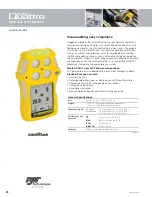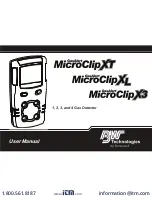
CS102
19/04/2010
© 2008
Velleman Components nv
8
signals coming from the detector. You should always listen for the specific characteristics of a
signal. Determine over how large an area the contact generates a signal to try and "outline" the
object before you dig. Listen for the sharpness or dullness of the signal and determine the
strength of the signal. A coin generates a sharp signal, while the signal for a nail is vague.
Batteries
•
Always carry a spare set of batteries when going out on a fieldtrip.
•
Using headphones will increase batteries life-time.
11.
Cleaning and storage
•
The life of your detector is shortened by neglect or careless use. Wipe the housing with a damp
cloth and then wipe it dry carefully if you have used the detector in a hostile environment (salty
water, sand, etc.).
•
Do not clean the detector with solvents or detergents.
•
The search coil is waterproof and can be submerged in either fresh or salt water. However, do
not let water enter the control box. Rinse the search coil with fresh water after using in salt
water.
Salt damage
•
Salty air can penetrate the control box in case of frequent use in a salty environment. Parts of
the electronic circuitry may corrode. You can protect your metal detector by covering the control
box with polythene. The warranty does not cover damage caused by salty environments.
Storage
•
Store the detector in a dry and warm environment under normal humidity conditions.
•
Remove the batteries to prevent them from leaking if the metal detector is to be stored for long
periods.
12.
Troubleshooting
•
Before turning the device in for repair, read this section as it might contain the solution for your
problem.
•
When problems occur, first check the batteries. Replace the batteries when necessary and
ensure the connections are correct and secure.
Oscillating Signal
•
This is caused most often by outside sources such as fluorescent lights, radios, power lines and
the proximity of other metal detectors. There’s not much you can do about it.
Intermittent Sound from Speaker
•
This can have several origins:
o
This could be due to poor battery connections. Make sure the batteries are securely clipped in
place.
o
A radio transmission from a passing taxi or another vehicle using radio transmitter
equipment.
o
The speaker may have come loose. Have your dealer fix the speaker back into place.
The detector drifts out of tune
•
The metal detector can be affected by changing temperatures e.g. when the device is taken out
of storage and out into the field. Wait a while until the temperature of your CS102 has stabilised.
The device may need as much as half an hour to acclimatise if the change in temperature is
extreme.
•
Sometimes batteries will cause the signal to drift. Replace them if this is the case.
13.
Code of Conduct
•
Do not interfere with archaeological sites or ancient monuments. Join your local archaeological
society if you are interested in ancient history.
•
Do not leave a mess. Use a sharpened trowel or knife to cut a neat circle or triangle, extract the
object and carefully replace the soil and the grass.
•
Help keep your country tidy. Bottle tops, silver paper and tin cans belong in a waste bin. Rusty
iron and other scrap should be collected and taken to a specialized company for further handling.
•
Do not trespass: ask permission before venturing onto private property.
•
Report all historical finds to the local museum or government and get expert help if you
accidentally discover a site of archaeological interest.
•
Be very careful if you discover any live ammunition or any lethal object such as an unexploded
mine. Do not touch the object! Mark the site carefully and report the find at once to the local
police.
•
Do not leave gates open when crossing fields and do not damage crops or frighten animals.









































